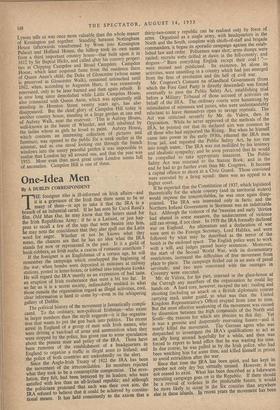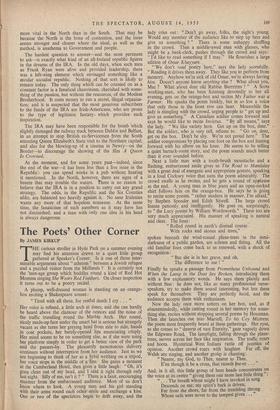One-Idea Men
J By A DUBLIN CORRESPONDENT THE foreigner who is ill-informed on Irish affairs—and it is a grievance of the Irish that there seem to be so many of them—is apt to take it that the IRA is a branch of an industrial cartel. If he has seen Sir Carol Reed's film, Odd Man Out, he may know that the letters stand for the Irish Republican Army : if he is a Latinist, or just hap- pens to recall a few of the tags that were beaten into him, he may note the coincidence that they also spell out the Latin word for anger. Whether or not he knows what they mean, the chances are that he has no idea what the IRA stands for now or represented in the past. Is it a guild of bank-robbers, an Irish mafia, a caucus of romantic anarchists ?
If the foreigner is an Englishman of a certain age, he will remember the campaign which overlapped the beginning of the war, when bombs were deposited in suitcases at railway stations, posted in letter-boxes, or lobbed into telephone kiosks. He will regard the IRA'merely as an expression of bad taste, an eruption of Irish exuberance that went a bit too far. In so far as it is a secret society, indissolubly wedded to what those outside the organisation regard as illegal activities, cool, clear information is hard to come by—even in the whispering gallery of Dublin.
The political history of the movement is fantastically compli- cated. To the ordinary, non-political Irishman—who exists in larger numbers than the myth suggests—it is the organisa- tion that wants to put the gun back into politics. The recent arrest in England of a group of men with Irish names, who were driving a van-load of arms and ammunition when they were stopped by the police, has given rise to some speculation about the present state and policy of the IRA. There have been rumours of the establishment of a headquarters in England to organise a traffic in illegal arms to Ireland; and the police of both countries are undoubtedly on the alert. Since the Anglo-Irish Treaty of 1922 the IRA has been the movement of the irreconcilables. Its members rejected what they took to be a contemptible compromise. The revo- lution, they felt, had been betrayed by its leaders, who were satisfied with less than an all-Ireland republic; and although the politicians protested that such was their own aim, the IRA refused to believe that it could be achieved by constitu- tional means. It has held consistently to the axiom that a thirty-two-count y republic can be realised only by force of arms. Organised as a single army, with headquarters in the North and the South, complete with chiefs-of-staff and brigade commanders, it began its sporadic campaign against the estab- lished law and order. Policemen were shot; arms dumps were raided; recruits were drilled at dawn in the hill-country; and slogans—" Burn everything English except their coal ! "- were minted and publicised. Its existence, let alone its activities, were unsettling in a country which had just emerged from the fires of revolution and the hell of civil war.
Mr. Cosgrave's Cumann na nGaedheal Government (from which the Fine Gael Party is directly descended) was forced eventually to pass the Public Safety Act, establishing trial before a Military Tribunal of those accused of activities on behalf of the IRA. The ordinary courts were hamstrung by intimidation of witnesses and jurors, who were understandably reluctant to leave themselves open to savage reprisals. The Act was criticised severely by Mr. de Valera, then in Opposition. While he never approved of the methods of the IRA, he pointed out that its declared aim was common to all those who had supported: the Rising. But when he himself came into power in the early 1930s, released the IRA men from jail, and repealed the Public Safety Act, he too ran into rough water. The IRA was not mollified by his leniency and idealistic sympathy; and he soon perceived that he would be compelled to take appropriate measures. The Public Safety Act was returned to the Statute Book; and in the end he had to' go further even than Mr. Cosgrave. It became a capital offence to shoot at a Civic Guard. Those convicted were executed by a firing squad.: there was no appeal to a higher court. If he expected that the Constitution of 1937, which legislated theoretically for the whole country (and its territorial waters) would impress the irreconcilables, he was once again disap- pointed. The IRA was interested only in facts; and the Northern Ireland Government in Stormont was an indubitable fact. Although the violence of the 'twenties and early 'thirties had abated in some measure, the underciirrent of violence still ran strong, if not clear. In 1939 the IRA formally declared war on England. An ultimatum and a declaration of war were sent to the Foreign Secretary, Lord Halifax, and were followed by what may be described as the terror of the bomb in the enclosed space. The English police went to work with a will, and judges passed heavy sentences. Moreover, the start of the Second World War, with its documentary restrictions, increased the difficulties of free movement from place to place. The campaign fizzled out in an aura of penal servitude; and two men concerned with the outrages in Coventry were executed. Mr. de Valera, for his part, interned in the glass-house at the Curragh any members of the organisation he could lay hands on. A hard core, however, escaped the net: raiding and shooting (including an attack on a British diplomatic courier carrying mail, under guard, to what was then the United Kingdom Representative's Office) erupted from time to time. But the most effective weakening of the movement was caused by dissension between the high co ands of the North and South—the reasons for which are bscure to this day. Yet it was a genuine and desperately enervating, fissure—and it nearly killed the movement. The German agent who was despatched to investigate the IRA's qualifications to act as an ally hung 'around hopefully for a while, and then was forced to report to head office that he was wasting his time. In due course, he was pulled in by the Irish police, who had been watching him for some time, and killed himself in prison to avoid extradition after the war.
Since that time the IRA has been quiet, and has kept its powder not only dry but virtually unused. However, it has not ceased to exist. What has been described as a lukewarm recruiting campaign goes on in the Republic. If there should be a revival of violence in the predictable future, it would be more likely to occur in the Six counties than anywhere else in these islands. In recent years the movement has been more vital in the North than in the South. That may be because the North is the bone of contention, and the issue seems stronger and clearer where the ideal, as well as the method, is anathema to Government and people.
The hardest question to answer—and the most pertinent to ask—is exactly what kind of an all-Ireland republic figUres in the dreams of the IRA. In the old days, when such men as Frank Ryan were alive and provided leadership, there was a left-wing element which envisaged something like a secular socialist republic. Nothing .of that sort is likely to remain today. The only thing which can be counted on as a constant factor is a fanatical chauvinism, cherished with some- thing of the passion, but without the resources, of the Moslem Brotherhood. It costs money to run a secret, illegal organisa- tion; and it is suspected that the most generous subscribers to the funds of the IRA are Irish-Americans, who are prone to the type of legitimist fantasy. which provides- such inspiration.
The IRA may have been responsible for the bomb 'which slightly damaged the railway track between Dublin and Belfast, in an attempt to stop British ex-Servicemen from the South attending Queen Elizabeth's State visit to the Northern capital; and also for the blowing-up of a cinema in Newry—on the Border—to discourage the showing of the film A Queen Is Crowned.
At the moment, and for some years past—indeed, since the end of the war—it has been less than a live issue in the Republic: you can spend weeks in a pub without hearing it mentioned. In the North, however, there are signs of a breeze that may trouble the waters. There is no reason to believe that the IRA is in a position to carry out any grand strategy. The odds, in the Republic and the Six Counties alike, are balanced too heavily against it. No sane Irishman wants any more of that hopeless nonsense. At the same time, the fanaticism of such members as it may have has not diminished; and a man with only one idea in his head is always dangerous.



































 Previous page
Previous page